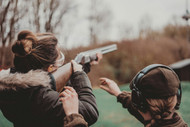The Importance of Regular Firearm Training
Posted by G-TEN on 11th Jul 2024
Owning a firearm is a significant responsibility that extends beyond the purchase. To ensure safety, proficiency, and confidence, regular firearm training is essential. Continuous practice and training not only improve your shooting skills but also enhance your understanding of firearm safety and handling. For gun owners, finding the right training opportunities is crucial. In this post, we will emphasise the importance of regular firearm training and offer tips on finding local ranges and instructors.
Why Regular Firearm Training is Essential
1. Safety First
Safety is the paramount concern when handling firearms. Regular training reinforces safe handling practices and helps you become more familiar with your firearm's operation. This reduces the likelihood of accidents and ensures you can safely manage your firearm in various situations.
2. Skill Improvement
Shooting is a skill that requires consistent practice. Regular training helps you:
- Improve Accuracy: Regular practice helps you refine your aim and accuracy, ensuring you can hit your target consistently.
- Enhance Reaction Time: Training under different scenarios improves your reaction time, crucial in both competitive shooting or hunting.
- Develop Muscle Memory: Repeated practice helps develop muscle memory, allowing you to handle and operate your firearm instinctively.
3. Building Confidence
Confidence in handling your firearm comes from familiarity and practice. Regular training sessions help build this confidence, ensuring you remain calm and composed under pressure.
4. Staying Updated
Firearm laws, safety protocols, and technology are constantly evolving. Regular training keeps you updated with the latest information and techniques, ensuring you remain compliant with laws and knowledgeable about new advancements.
Tips for Finding Local Ranges and Instructors in the UK
1. Research Local Ranges
Finding a good shooting range is the first step in maintaining regular training. Here’s how you can find a suitable range in the UK:
- Online Search: Use search engines and shooting sport websites to find local ranges. Websites like the National Rifle Association of the UK (NRA) and British Association for Shooting and Conservation (BASC) provide directories of shooting ranges.
- Visit Local Gun Shops: Local gun shops often have information on nearby ranges and can provide recommendations.
- Join Shooting Clubs: Many clubs have their own ranges and provide regular training sessions for members. Clubs can be found through organisations like the NRA and BASC.
2. Choose the Right Instructor
A qualified instructor is vital for effective training. Here are some tips for choosing the right one:
- Credentials and Experience: Look for instructors with recognised certifications and extensive experience in firearm training.
- Specialisation: Choose an instructor who specialises in the type of shooting you are interested in, whether it's sport shooting or hunting.
- Reviews and Recommendations: Seek reviews from other shooters or ask for recommendations from local ranges and clubs.
3. Attend Training Courses and Workshops
Training courses and workshops provide structured learning and practice:
- NRA Courses: The NRA offers various courses and workshops tailored to different skill levels and shooting disciplines.
- BASC Courses: BASC provides courses on rifle shooting, shotgun skills, and more, focusing on safety and proficiency.
- Private Training Sessions: Many instructors offer private sessions, allowing for personalised training tailored to your needs and schedule.
Regular Practice Tips
To make the most of your training sessions, consider the following tips:
- Set Goals: Define clear, achievable goals for each training session, such as improving your accuracy or learning a new technique.
- Mix Up Your Practice: Incorporate different drills and scenarios to build a wide range of skills. This can include target shooting or rapid-fire drills.
- Maintain Your Equipment: Regularly clean and maintain your firearm to ensure it functions correctly during practice.
- Document Your Progress: Keep a training log to track your progress and identify areas that need improvement.
Conclusion
Regular firearm training is a crucial aspect of responsible gun ownership. It ensures safety, improves skills, builds confidence, and keeps you informed about the latest developments in firearm use and regulations. For UK gun owners, finding the right ranges and instructors is key to maintaining a consistent training regimen. By committing to regular practice and seeking out professional training, you can enhance your proficiency and safety, making you a more responsible and skilled firearm owner.

